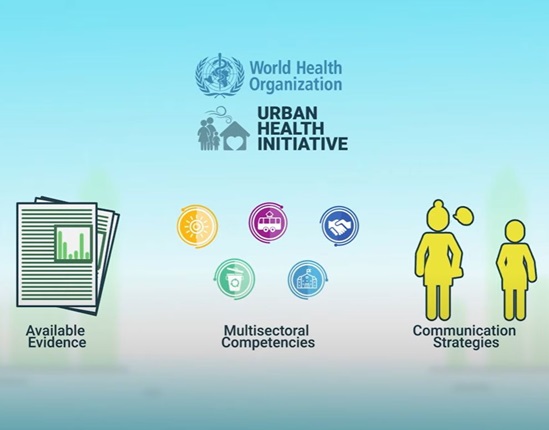Accra, Ghana
Accra is one of the fastest growing cities in Africa, with an annual population increase of more than 2%. More than 4 million people live in the Greater Accra Metropolitan Area, with a daily influx of 2.5 million business commuters. The population is expected to grow to 9.6 million by 2050.
Led by WHO, the Urban Health and Short-Lived Climate Pollutants (SLCP) Reduction Project, launched in 2016, worked with international and local government experts to integrate health into transport, household energy, land-use and solid waste management policies.
This project has been a proving ground for the UHI model process. The project’s activities promote the implementation of SLCP reduction strategies by mobilizing and empowering the health sector and building on its influential position, to demonstrate the full range of health benefits that can be achieved from implementing SLCP reduction strategies at the city level.

Featured publication

Multimedia
1. Map stakeholders and policies impacting urban environments
The Initiative started by assessing air quality in the city, mapping sources of air pollution, related policies and initiatives, as well as identifying key stakeholders. Conducted by UN-Habitat and ICLEI Local Governments for Sustainability, the Initiative identified four main sectors impacting air quality: transport (including walking and cycling), energy (household energy for cooking and lighting), solid waste management (including open burning and e-waste) and urban land-use and spatial planning.
2. Building capacity for effective engagement
The second step was to improve the capacities of the health, environment and other city sectors to engage in cross-sector policy-making and communicate effectively with the public on links between climate, air pollutants and health. Experts were trained to engage in cross-sector policy-making and communicate effectively with the public on links between climate, air pollutants and health. This step also involved training on the use of various assessment tools.
3. Tools for assessing health and economic impacts used locally
Tools to assess the health and economic impacts of policies related to air pollution in the identified sectors were evaluated and applied to the local setting. These included: AirQ+ (a software tool for health risk assessment of ambient and household air pollution); HEAT (Health and economic assessment tool for walking and cycling) and WHO’s Household Multiple Emission Sources (HOMES) model, among other tools.
4. Alternative scenarios and policy options tested
Alternative scenarios were tested to identify preferred policy interventions. These scenarios were used to develop city-level action plans and roadmaps, allowing local data and expertise to be unlocked and helping to ensure the sustainability of the work at the country and city level.
- Analysis of ambient air pollution found that if air pollution is reduced to WHO guideline levels, 1790 premature deaths could be prevented every year in Accra and around US$ 247 million in welfare costs saved (2018 figure).
- Analysis of household air pollution found over 1900 averted deaths and a reduction of 35% in exposure under the most ambitious scenario through the promotion of LPG, biogas or electricity as substitutes for wood and charcoal.
- Analysis of the transport sector estimated 5500 averted deaths from reduced air pollution, and an additional 33 000 averted deaths from increased physical activity in the most ambitious policy scenario projected over the next 35 years – including increasing public transport, fleet fuel economy, and infrastructure for walking and cycling, while reducing reliance on cars – resulting in an economic health benefit of almost US$ 15 million.
- Analysis of the waste management sector found ceasing open burning (a major contributor of black carbon) will lead to a 50% reduction in emissions and 19% capture of landfill gas by 2050.
- Finally, economic analysis of the costs of air pollution in Accra found that the direct costs to individuals, particularly people working in the informal sector to be catastrophic, while the cost benefits of controlling air pollution to be highly cost-effective. The analysis also found the economic welfare benefits of the Bus Rapid Transit in Accra outweigh the costs of the intervention.
5. Urban leaders engaged to communicate cost of inaction
The Initiative then launched a communications campaign targeting policy-makers, health sector and the public promoting health co-benefits, as well as tools, experiences and lessons learned. In 2018, Accra became the first African city to join the BreatheLife, a global campaign to commit cities to meet the WHO air quality guidelines. Media training to engage editors and publishers led seven media houses to make long-term commitments to follow the air pollution, climate change and health story. Community outreach in eight sub-metro areas using education, theatre groups, school activities and workshops with traditional Chiefs and Queen Mothers led to joint efforts between communities and regulators to mitigate air pollution sources.
6. Policy tracking and monitoring outcomes
The final step of the Initiative has been to develop a policy-tracking framework to track policy changes and understand the climate and health outcomes of Accra's initiatives. As a result of applying the Urban Health Initiative model process in Accra, various policy recommendations and tools have been incorporated into Accra's local strategies, including the Air Quality Management Plan, the Accra Resilience Strategy and the city’s 2020 Climate Action Plan. Accra has also pledged to cut carbon emissions to zero by 2050.
The city has gained a profile as a global leader in addressing air pollution and mitigating climate change, even winning recognition in 2019 as one of the "World's seven best climate projects" for its efforts to better integrate informal waste collectors into Accra's waste management system.
The success of the Initiative in Accra has led other cities in Ghana to express interest in applying the model process and representatives from several African cities have travelled to Accra to learn from the city’s approach. The Urban Health Initiative in Accra has shown how equipping the health sector with the data, tools and capacity can unlock the full range of economic and climate benefits for cities through health-informed policies.
Health issue briefings

The Urban Health Initiative (UHI) goes beyond improving access to health care and promoting healthy behaviours, and focuses on how to build cities that...

Air pollution: effects on your body
Air pollution is one of the world’s leading killers. Globally, air pollution causes some 7 million deaths annually from outdoor and household sources....

Air pollution: communications to promote health
Communications and outreach to policy-makers and the wider public are essential to mobilize and sustain support for policy solutions to air pollution and...

Tools for cleaner, healthier air in cities
The Urban Health Initiative promotes tools and guidance to assess the health impacts of air pollution and the health benefits of sustainableRead moreImplementing...

Air pollution: economics and urban health
Economics plays a vital role in health policy-making and investments to reduce air pollution; in helping to understand the costs of health care; and in...

Clean cooking for health
Clean and sustainable household energy and appliances, for cooking, heating and lighting can improve health, increase productivity, reduce poverty and...

Solid waste management, air pollution and health
Waste management options such as recycling, composting, incineration and landfill impact health and well-being in profound ways, particularly for people...

Sustainable transport for health
Sustainable transport systems can protect and promote health, by reducing risks from vehicular air pollution, physical inactivity and traffic injuries,...
Featured publication

Tracking urban health policies
Publications

Ambient and household air pollution are a major cause of death and disease globally. This public health threat is being increased due to the rapid urbanization...

Solid waste management and health in Accra, Ghana
Accra is a city that has grown enormously in the last decades. According to the most recent census (2010), the total population of Greater Accra is approximately...

Economic costs of air pollution in Accra, Ghana
Air pollution is one of the most important global environmental health risks today. Combined with the shift of global populations to living predominantly...

Ambient air pollution and health in Accra, Ghana
Accra is a city that has experienced rapid growth in the last decades. According to the last available census, in 2010, the total population of the Greater...

Tracking urban health policies
To enhance health co-benefits across urban policies which tackle air pollution and climate change, WHO, in cooperation with various international, national,...

Evidence-based strategies to reduce the burden of household air pollution in Accra, Ghana
Air pollution is one of the most important global environmental health risks today. Combined with the shift of global populations to living predominantly...

Globally, in 2010, the transport sector accounted for 14% of the greenhouse gases (GHG) budget (1). In developing countries, the rapid pace of motorization...

This sourcebook aims to detail why health needs to be part of urban and territorial planning and how to make this happen. It brings together two vital...

